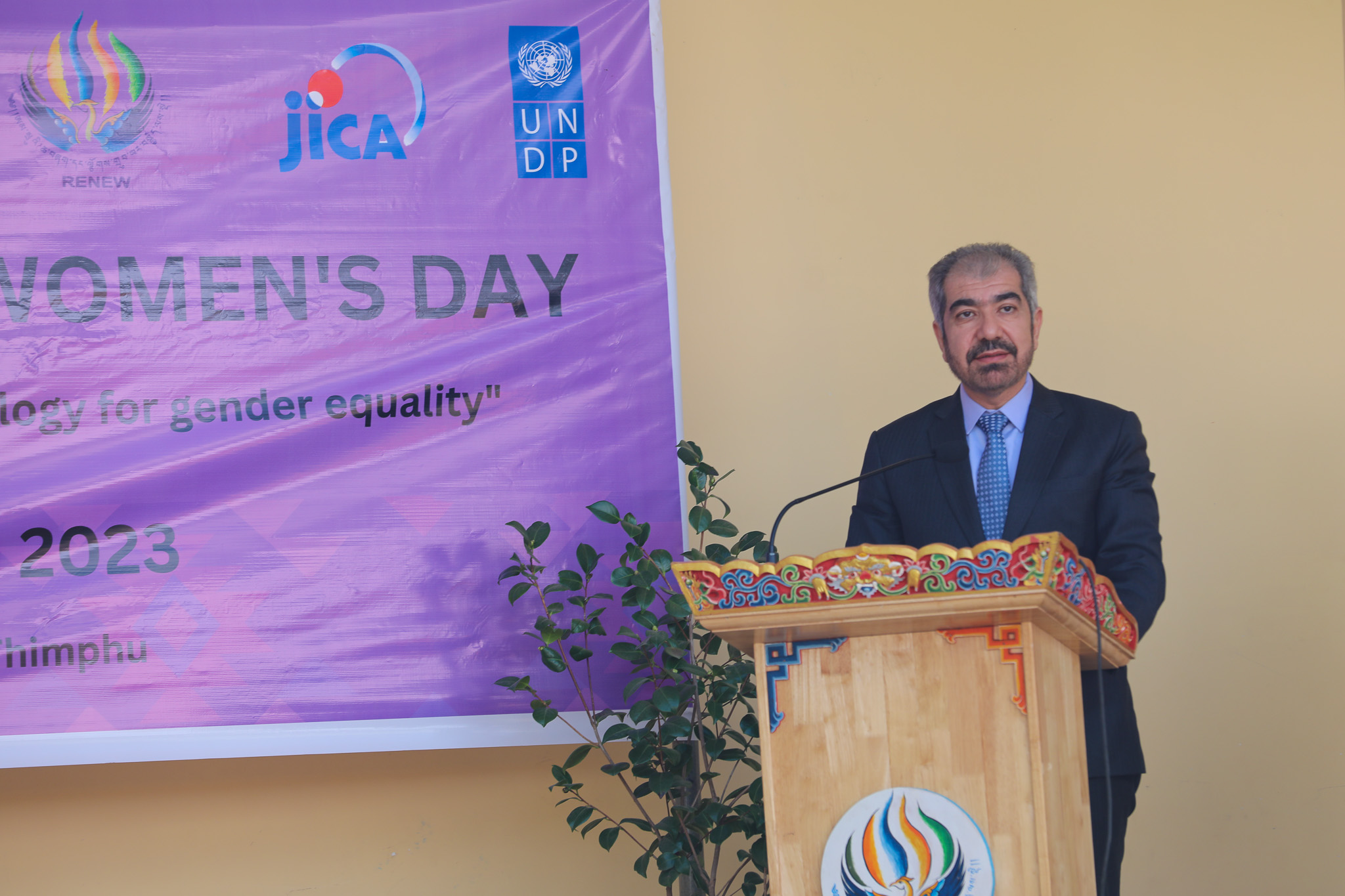UNDP RR Statement at the celebration of 2023 International Women's Day
March 28, 2023

UNDP Bhutan Resident Representative Mohammad Younus speaking at the 2023 International Women's Day celebration in Thimphu
Kunzangpola.
First, let me wish everyone gathered here a very Happy Women’s Day.
It is an enormous honor and pleasure to be here and address this august gathering on the occasion of International Women’s Day- an important day celebrated globally every year on March 8.
Thank you, National Commission for Women and Children (NCWC) and RENEW, for the opportunity.
The world and Bhutan have come a long way in terms of advancing gender equality. Over the years, we have achieved a series of notable “firsts” in many fields. At the same time, gender gaps persist.
And the gap is nowhere more glaring than in the tech industry.
Women remain underrepresented in the tech field as ICT specialists, in the C-suite of tech companies, as tech start-up owners and gig workers. Only 28 per cent of the STEM industry board seats and a meagre 3 per cent of CEO positions are held by women.
I think it’s safe to say the story isn’t any different in Bhutan.
UNDP partnered with the erstwhile Ministry of Labour and Human Resources on two Digital Jobs Challenge in 2021 and 2022 respectively. The challenge received overwhelming applications but witnessed negligible women participation.
The first challenge saw 106 tech-savvy youth take part, while the second challenge attracted 420 applications. But of the 21 winners of first Digital Jobs Challenge, only one was a woman. In the second challenge, only three of the 25 winners were women.
This year’s Women’s Day theme is “DigitALL: Innovation and technology for gender equality”.
It recognizes the prevalence of digital gender gap and its impact on widening social and economic impacts and highlights the need for inclusive and transformative technology and digital education.
Indeed, we must include women and girls in the digital world at all costs.
Because inclusion of women in the tech world results in more creative solutions and innovations that meet women’s needs and promote gender equality.
Leaving women behind, on the other hand, comes with massive costs.
UN Women’s Gender Snapshot 2022 report says women’s exclusion from the digital world has shaved one trillion dollars from the GDP of low- and middle-income countries in the last decade.
A loss that’s poised to grow to 1.5 trillion dollars by 2025 if we don’t act now.
Gender parity in innovation, technological change and digitalization is also crucial for:
- Enhancing awareness of women and girls regarding their rights and civic engagement.
- Promoting innovative solutions to promote gender equality.
- Addressing development and humanitarian challenges.
- And accelerate achievement of the Sustainable Development Goals.
The digital technology present opportunities, but also risks. It has led to widespread and increasing forms of online violence. And women are 27 times more likely to face harassment online than men.
A study of 51 countries revealed 38 per cent of women had personally experienced online violence. This violence in the digital public and political life is threatening women and girls’ participation, as well as their mental health and wellbeing.
We must work towards creating a world where women and girls can live free from online violence
At UNDP, gender equality and women’s empowerment are central to our work in Bhutan and across the globe.
Our programmes and projects are informed by gender analysis in their design and implementation. We identify and integrate the different needs, constraints, contributions and priorities of women, men, girls and boys into our programming.
We strengthen interventions to tackle structural changes and remove the institutional, societal, political and legal barriers to gender equality and women’s empowerment.
We ensure our programmes and projects do not discriminate against women or girls or reinforce gender-based discrimination and/or inequalities.
UNDP is privileged is to be key partner of the Royal Government on gender equality and women’s empowerment. Allow me to share some of our key recent work in the gender space.
Together with the National Commission for Women and Children, we piloted an innovative project that tackled the root causes of problematic social norms that lead to violence against women and children.
The project was rolled out to three schools following a successful pilot. I am pleased to learn that the Ministry of Education and Skills Development is looking at scaling up the initiative.
Our partnership with the Judiciary on e-Litigation and Legal Aid Centre puts women at the front and centre of its services, ensuring access to justice for all, especially vulnerable women and girls.
The introduction of iCTG, a mobile device for pre-natal care, on which we partnered with the Ministry of Health and JICA, is helping ensure safe childbirth in remote parts of the country.
We have worked closely with RENEW in empowering vulnerable women by equipping them with livelihood skills.
With this, let me once again thank NCWC and RENEW for the opportunity.
UNDP will continue to remain on the frontlines of digitalization and innovation. And our digital work will focus on enhancing women’s participation in the digital economy.
And we remain committed to further deepening our partnership with the Royal Government:
- To move the needle on gender equality.
- To close the digital gender gap.
- To give women and girls equal access to technology and digital skills.
- And to end technology-facilitated violence against women and girls.
Thank you and Tashi Delek!
####

 Locations
Locations



